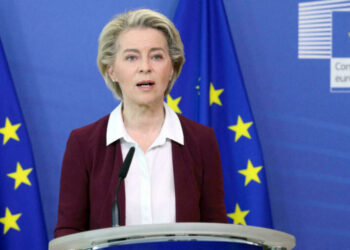Eurozone equity markets sank Tuesday on news that the region’s inflation rate hit another record high in May on fallout from Russia’s invasion of Ukraine.
Consumer prices in the eurozone rose by 8.1 percent, compared with 7.4 percent in April, official data showed, with energy surging the fastest.
Sentiment took another battering on fears of severe economic fallout from a deal agreed by the European Union late Monday for a partial embargo of Russian oil imports over its assault on Ukraine.
The embargo also sent oil prices soaring to two-month peaks, in turn fueling more inflationary fears and pressuring central banks to tighten monetary policy and prevent consumer prices rocketing even higher.
The resurgent oil market, however, lifted the London stock market because it boosts profits and revenues for energy majors BP and Shell.
Energy ‘may soar faster’
“Inflation in the eurozone increased even further,” said Jonas Keck, economist at UK-based research group the Centre for Economics and Business Research.
“As the EU reached an agreement on new sanctions targeting Russian oil supplies, energy prices may well soar even faster in the coming months.”
Markets have been rocked this year as the Ukraine conflict has fueled massive price gains for energy and food, translating into soaring inflation that threatens to derail the post-pandemic economic recovery.
Red-hot eurozone inflation has intensified calls for interest rate hikes from the European Central Bank, which has already flagged plans to raise borrowing costs in July.
“Higher inflation rates will raise serious question marks about the ECB’s viewpoint on whether gradual rate increases will be enough to deal with such high price growth,” market analyst Fawad Razaqzada from City Index and FOREX.com said.
“Investors are starting to project a faster pace of tightening from the ECB, which could be another factor holding stocks back.”
Following a holiday weekend in the US, Wall Street stocks were also on the backfoot, as a survey showed that Americans’ feelings about the economy deteriorated in May but remained relatively strong even as high inflation bites.
Brent oil tops $124
In reaction to the EU’s partial embargo, Brent oil briefly broke above $124 per barrel and WTI crude breached $119.
European chiefs said the latest sanctions would ban purchases of Russian oil delivered by sea, though there would be a temporary exemption for pipelines.
“The gradual phasing in of the deal along with the exemptions included prevented the price from rising much higher but ultimately it further tightens a market that’s already undersupplied,” said Craig Erlam at OANDA.
While widely expected, the agreement adds further upside to crude just as China begins to ease Covid restrictions in Shanghai and Beijing, raising the likelihood of a jump in demand from the world’s number-two economy.
There was some much-needed cheer from data showing China’s manufacturing shrunk in May at a slower rate than expected.
The Purchasing Managers’ Index (PMI) — a key gauge of manufacturing activity — hit 49.6 last month, improving from 47.4 in April, which was the worst reading since early 2020.
However, it remained below the 50-point mark separating growth from contraction and showed the Chinese economy was still struggling.
Key figures at around 1550 GMT
Frankfurt – DAX: DOWN 1.3 percent at 14,388.35 points (close)
Paris – CAC 40: DOWN 1.4 percent at 6,468.80 points (close)
EURO STOXX 50: DOWN 1.4 percent at 3,789.21 points
London – FTSE 100: UP 0.1 percent at 7,607.66 points (close)
Brent North Sea crude: UP 1.4 percent at $123.37 per barrel
West Texas Intermediate: UP 1.95 percent at $117.31
New York – Dow: DOWN 0.3 percent at 33,111.09 points
Tokyo – Nikkei 225: DOWN 0.3 percent at 27,279.80 (close)
Hong Kong – Hang Seng Index: UP 1.4 percent at 21,415.20 (close)
Shanghai – Composite: UP 1.2 percent at 3,186.43 (close)
Euro/dollar: DOWN at $1.0733 from $1.0779 on Monday
Pound/dollar: DOWN at $1.2624 from $1.2652
Euro/pound: DOWN at 85.01 pence from 85.20 pence
Dollar/yen: UP at 128.51 yen from 127.59 yen























